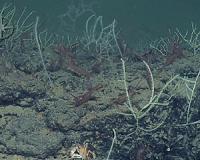| . |  |
. |
Madrid (AFP) Oct 8, 2010 Environmental groups Friday criticised scientists' recommendations for fishing quotas of the lucrative but endangered bluefin tuna, which they warned are based on out-of-date and unreliable data. The scientists on the Standing Committee on Research and Statistics (SCRS) of the International Commission for the Conservation of Atlantic Tunas (ICCAT) concluded a four-day meeting in Madrid on Friday. They issued recommendations to be presented to ICCAT, the inter-governmental group responsible for managing its stocks, at a meeting in Paris in November. At its last meeting, in Brazil last November, ICCAT agreed to cut its catch for bluefin tuna in the eastern Atlantic and Mediterranean by 40 percent, from 22,000 tonnes in 2009 to 13,500 in 2010. SCRS said maintaining the allowable catch at 13,500 tonnes for 2011-2013 "will likely allow the stock to increase" and allow it to recover by 2022 "with at least 60 percent probability." But they warned of "unquantified uncertainties" in gathering reliable data. "Most of the data limitations that have plagued previous assessments remain and will require new approaches in order to improve the scientific advice the Committee can offer," the report said. The environmental group WWF slammed the recommendations and called for a quota of "below 6,000 tonnes per year." "The very data on which the scientists have based their analyses are severely inadequate and show many gaps," it said in a statement. "WWF is shocked at the lack of precaution perpetuated by ICCAT in bluefin tuna management, and we are urging for catches to be slashed by at least half," Dr Sergi Tudela, head of fisheries at WWF Mediterranean, was quoted as saying in the statement. "Tuna stocks are struggling at a mere third of sustainable levels, yet rules are continuing to be flouted and reporting duties ignored -- meaning ICCAT's scientists can't even do their job properly." The Pew Environment Group, a Washington DC-based non-governmental organisation, charged the SCRS had "failed to recommend solid, scientifically-based catch limits." It called on ICCAT countries at the Paris meeting to suspend bluefin fishing and protect their spawning grounds as the "first two crucial steps." "Bluefin tuna fishing nations are providing scientists with out-of-date, incomplete and often unreliable information," said Remi Parmentier, a Pew Environment Group observer at the meeting. "Because of these glaring gaps in data, scientists are essentially being asked to gaze into a crystal ball and pick a number for bluefin tuna catch limits. "It allows fishing countries to assign bluefin tuna catch limits based on unfounded optimism instead of objective science. No species should have to rely on a crystal ball for its survival." Industrial-scale harvesting on the high seas has caused bluefin stocks to plummet in the Mediterranean and eastern Atlantic. A meeting of the Convention on International Trade in Endangered Species in Doha in March rejected a ban on trade in Atlantic bluefin tuna, after aggressive lobbying by the Japanese. A single 220-kilo (485-pound) fish can fetch 160,000 dollars (120,000 euros) at auction in Japan, which consumes three-quarters of all bluefin, mainly as sushi and sashimi.
Share This Article With Planet Earth
Related Links Water News - Science, Technology and Politics
 Coral Oasis Found In Mediterranean Desert
Coral Oasis Found In Mediterranean DesertTel Aviv, Israel (SPX) Oct 08, 2010 The exploration vessel Nautilus, with a team of experts of the University of Haifa's Leon H. Charney School of Marine Sciences, headed by Prof. Zvi Ben Avraham, discovered for the first time an area of reefs with deep-sea corals in the Mediterranean, offshore of Israel. This area apparently stretches over a few kilometers, 700 meters under the surface and some 30-40 km off the coast of Tel ... read more |
|
| The content herein, unless otherwise known to be public domain, are Copyright 1995-2010 - SpaceDaily. AFP and UPI Wire Stories are copyright Agence France-Presse and United Press International. ESA Portal Reports are copyright European Space Agency. All NASA sourced material is public domain. Additional copyrights may apply in whole or part to other bona fide parties. Advertising does not imply endorsement,agreement or approval of any opinions, statements or information provided by SpaceDaily on any Web page published or hosted by SpaceDaily. Privacy Statement |